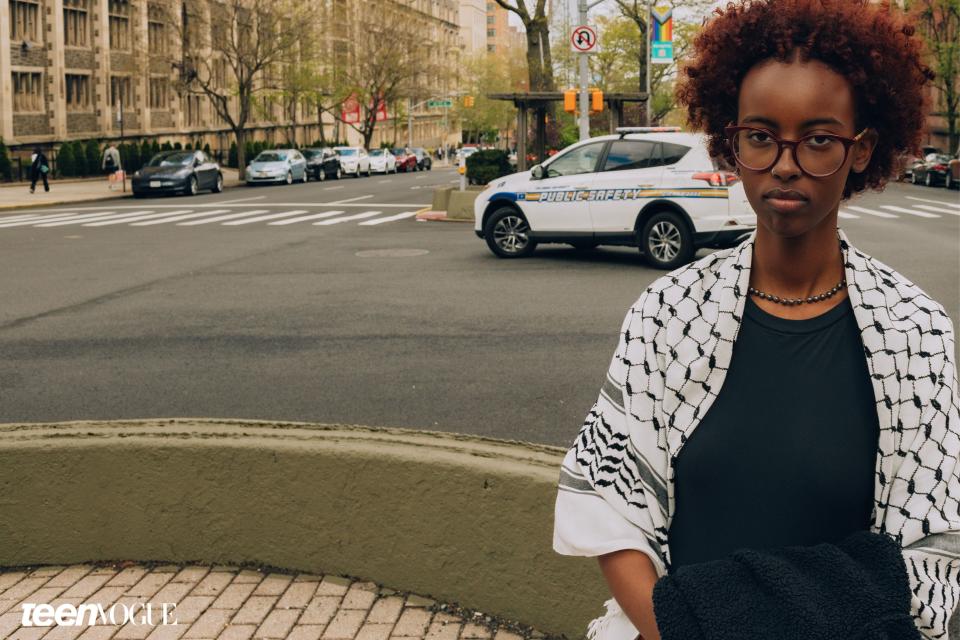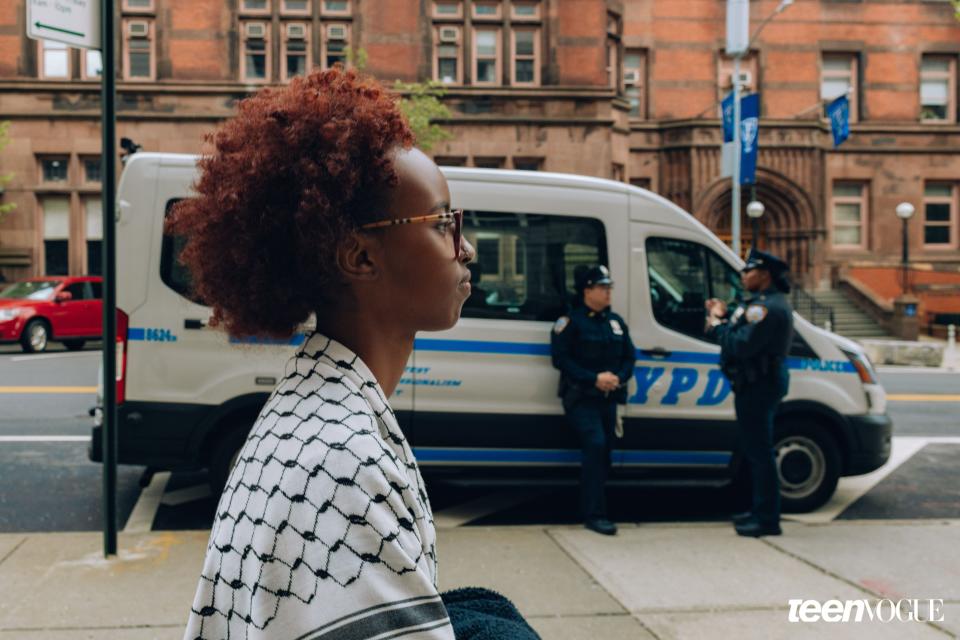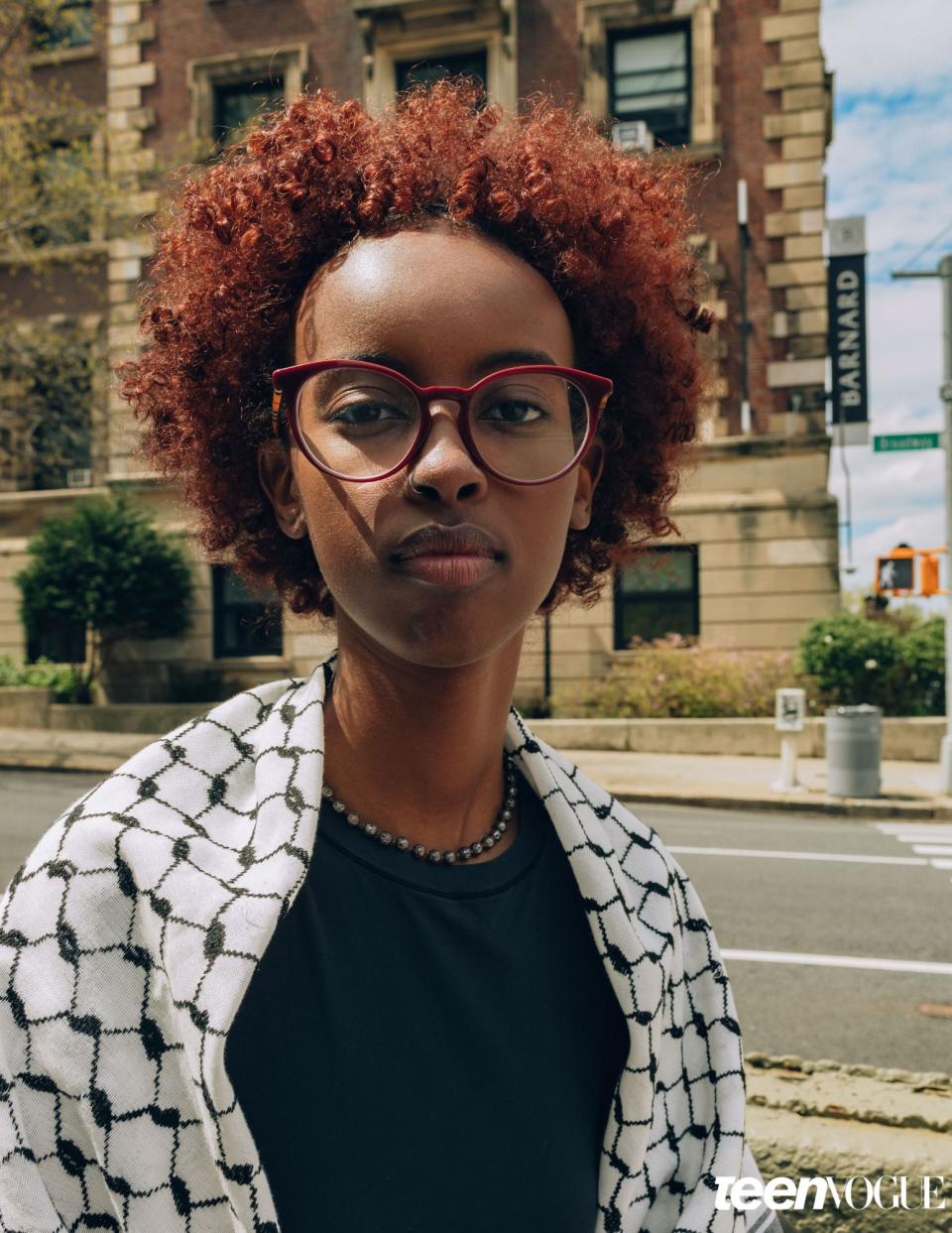Isra Hirsi, Ilhan Omar's Daughter, On Columbia Arrests, Barnard Suspension, Palestine Protests

- Oops!Something went wrong.Please try again later.
Maen Hammad
When Barnard junior – and former Teen Vogue cover star – Isra Hirsi, 21, tweeted on April 18 she was suspended for her involvement in the Gaza Solidarity Encampment at Columbia University, I immediately headed uptown so we could talk about the suspension. While I was on the subway, she stopped responding. Columbia students launched the encampment in the center of campus at 4 a.m. on Wednesday April 17, timed to a congressional hearing on campus antisemitism featuring Columbia University President Nemat “Minouche” Shafik. Though her mother, Rep. Ilhan Omar (D-MN), would go on to make noteworthy contributions at the hearing, Hirsi was otherwise occupied with the occupation.
Social media posts showed that during that same 1 p.m. block on Thursday, Shafik emailed the Columbia University community, informing them that she had officially told the New York Police Department to enter campus and dismantle the encampment. Isra, fellow Barnard junior Soph Askanase, and Barnard freshman Maryam Iqbal were the first to receive suspensions at the encampment; the three were arrested alongside over 100 students in the 20 minutes it took me to get into Columbia’s campus — past the police officers, campus security, additional hired Allied Universal private security, media, and protesters swarming the locked gates. (Despite the heavy security presence, NYPD Chief John Chell later told the Columbia Spectator that the students “offered no resistance whatsoever, and were saying what they wanted to say in a peaceful manner.")
That Thursday, Columbia became one of the nation’s trending topics, and Hirsi in particular caught intense heat, though not for the first time, as a longtime advocate on social justice issues. After her release, Hirsi faced being evicted from her dorm and inflamed social media backlash — much of which, she says, is based on “misunderstanding” and “misrepresentation.” Simultaneously, pro-Palestine campus encampments in solidarity with Columbia’s were popping up across the country, from Miami University in Ohio to the University of North Carolina to Yale. We met on Saturday at Morningside Park, 48 hours after her arrest.
This conversation was condensed and lightly edited for clarity.
Teen Vogue: Should we start at the beginning of the encampment Wednesday, or with the suspensions and arrests Thursday?
Isra Hirsi: I think there's some misunderstanding of what the camp was and what was happening in the camp. There's been a lot of assumptions about whether it was peaceful or not. Wednesday we set up at the crack of dawn. By the time the student body was awake, we had people watching, people supporting. We had faculty come and talk to us, we had a teach-in from a professor who was at Columbia during 1968.
It was a really beautiful community space; so many people providing donations, food, blankets. We had such an amazing crowd come and join us Wednesday night, which was so powerful and also made the camp feel stronger. We had had a very core group of folks who understood the risks, and then having that number grow alleviated a lot of our stress. We felt like we weren't alone.
TV: Who do you think is misrepresenting the encampment?
IH: In my suspension email that I received on Thursday morning, which has to do with what happened on Wednesday, it says that the school has to “ensure the students’ own physical or emotional safety and well-being, or if the student poses an ongoing threat of disruption of, or interference with, the normal operation of the College” — and to clarify, what happened was not at [Barnard] College, it’s at the university, and also was outside, so I don't really know how we were disrupting campus life. I think that those are misrepresentations. The university's president has been trying to state that this is a massive disruption, rather than what I would say is a community building space. (Teen Vogue reached out to Columbia University and Barnard College for comment.)
TV: All this was happening on Wednesday, while your mother was speaking at the Congressional hearing regarding your school, which people acted like was a big shock after news broke of your suspension.
IH: It was public information. It's pretty obvious. She tweeted congratulating me. On the internet you can easily find what university I go to, so I'm a little bit confused, especially because she is a free speech advocate and has always been, has always fought for the rights of students. But I mean, of course she was upset; I was sprayed with the [alleged] chemical weapons [in January], I was directly impacted, a lot of my own friends were hospitalized, and she was aware of that. It is personal for her.
TV: Were you following along with the hearing, or was that not possible, given the encampment?
IH: Yeah, I was. It is a Republican-controlled committee, so I was waiting to find out when she was gonna go on. We all were hearing about the students that were not being let into the Congressional hearing, so that was mostly the only thing we were paying attention to. Our biggest concern while this was happening was the thought of an imminent sweep. At that moment of time, we were really focused on survival and maintaining the crowd.
TV: At this point the cops haven’t come in, right?
IH: The police did not enter until literally the moment we were arrested. They had been outside of campus for a very long period of time, especially because of the solidarity actions happening outside, and they had been prepping; we had seen riot cops multiple times. But yeah, they did not enter until 1:30 on Thursday.


TV: So Thursday morning, you wake up in the camp.
IH: I woke up at 9 am. I was helping with security, standing by the door to see who enters and exits. If folks wanted to join us, we would have to give them the spiel of like, “do you know the risks?” as informed consent. I was walking around doing that, trying to get a meal, then me, Soph, and Maryam received the email at 10:23 am. At that moment, we made an announcement to the camp – because there were an overwhelming amount of Barnard students at camp – and let them know that we had been basically evicted and not allowed into our space, but also officially suspended.
From there, we ended up talking to school newspapers, then there was a support rally we spoke at, and then right after that rally had formally ended, we got notice that they were about to come in. We got into our formation, which was two concentric circles, linked arms, and prepared for arrest. That's when the police came onto the lawns and issued the LRAD and gave us our warnings. They kicked off all the press, they arrested our legal observers, and then they then arrested us. (Teen Vogue reached out to the NYPD for comment.)
From there I went to the correctional bus. It took about an hour for us to even get off the bus, and then I didn't enter One [Police Plaza] for another two hours, I was in the back of the line. Then when you got in it was an even longer process, because we had so many people who were born [assigned] female in our group that they didn't have enough space for us. It was a very slow process in getting everybody into the cells. I was zip-tied for about seven hours and wasn't released for about eight. So that was Thursday, and then we left and everybody was waiting for us at jail support. I got out, I think, between 9 and 9:30 pm.
TV: And you were charged with trespassing?
IH: Yes. The legal [National Lawyers Guild] observers got harder misdemeanor charges, “obstruction of governmental administration.”
TV: But you got out and couldn’t go back to your dorm.
IH: Honestly that was my biggest concern. Me and Maryam are the only ones that live in the dorms, and we were suspended pretty early, so we knew that we were not allowed to get back. When I got to 1 Police Plaza, my roommates had brought me a bag of clothes because they knew that I was likely evicted. We were reading our email and it said we had 15 minutes to go get our shit if we wanted it, and we'd have to go with a public safety escort. I was like, I'm not going to do that. But I was a little bit frantic, like, where am I going to sleep? Where am I gonna go? And also all of my shit is thrown in a random lot. It’s pretty horrible.
Have you seen the photo they showed to the desk attendants? The “no entry” photo? Maryam posted hers on Twitter, SJP posted mine. I live in a building where professors also live, and a lot of the professors that live in our buildings are in [Faculty and Staff for Justice in Palestine], so I reached out to them before I got out of jail like, can you guys please talk to desk attendants in my building? They were like, can we bring her in as our guest, anything? And they were like no, essentially. They also showed that [no entry] photo to every single public safety officer at Barnard and sent it to all my professors, so I kind of have no option.
TV: Are you formally banned from campus?
IH: The language isn't “banned,” the language is I don't “have swipe access.” For the Columbia students that were suspended, their language says that if you are found on campus you will receive more disciplinary action, but ours doesn't say that. And also, in my email, it doesn't explicitly say what else I have violated. [...]
I don't know when I can go home, and I don't know if I ever will be able to. I haven't formally been evicted. I haven't been sent a “move out” email, but they've just said that I can't get in, whatever that means. I have like four shirts, two pairs of pants. Only Barnard students are evicted, and I think it's pretty crazy.
I cannot go to the dining hall. I sent them an email like, “Hey, I rely on campus for my meals, I rely on my dining plan,” and they were like, Oh, you can come pick up a prepackaged bag of food, a full 48 hours after I was suspended. There was no food support, no nothing. The Columbia students still have access to a dining hall and to their homes; they can't go anywhere else, but they can go home and to one dining hall.
TV: Why do you think it’s going differently for Barnard students?
IH: I think it's really on a school-by-school basis, and Barnard has decided to take a very egregious stand against us. I think that they feel like there isn't a big limelight on them right now and that they have the ability to do this, because Shafik was on the congressional stage and is actively being harassed about what she's doing, versus [Barnard president] Laura Rosenbury has the ability to skirt what's going on. She's not the one sending the correspondence, it's all College Dean [Leslie] Grinage.
It is really confusing and concerning, especially because the majority of the Barnard students are femme-identifying.... A lot of them are staking out in their dorms right now because they haven't been kicked out. We've told them the best option is not to leave, the minute they leave, they can't get back in.
TV: So what next?
IH: Genuinely we have no clue. Our interim suspension is contingent on what happens at our hearings, which has not been set. They told us that we would receive a date by Monday at noon, so I'm basically at least houseless until then. …
They are literally starting a 15 minute timer if you go and try to get your stuff. I know Maryam did it; I refused, I'm not going to subject myself to that. One of my professors went and tried to retrieve a student's belongings and public safety treated her like complete shit as well, like the student was a criminal. It's not the fault of public safety, but it's egregious to make them enforce such cop-like procedures, this is not in their purview. [...]
TV: How has the last week’s focus on Columbia felt?
IH: A lot of us are grateful that people are paying attention and noticing how severe our campus repression has been, but it has been a little bit frustrating to focus on Columbia over the focus of what is even happening in Gaza. The whole point of the encampment was to shed light on Columbia's complicity in genocide and to focus back on the folks in Gaza, so a big thing for all of us is trying to redirect the language.
We will [also] be donating as much as we can, after all the suspended students have been supported, to Gaza. We know that we don't need this much money. Things for the camp are being purchased, but our big thing is so many Barnard undergrads have no food, so it's our first thing.
It is very difficult being evicted and not having access to our homes; so many of the PhD students are [being threatened with] losing their jobs. These are all detrimental and horrible things, but alhamdulillah we are all still here and alive and have roofs over our heads, despite it all. People have supported us. Shifting the focus, I think that's what the encampment is trying to do right now. We're holding it down, but we're holding it down for Gaza, not just because of the folks that have been suspended; and the repression is explicitly because of the fact that we were fighting for ending the war in Gaza. That also is really important to remember.
TV: Leading up to the Congressional hearing and continuing now, people have made accusations calling you all “terrorists.”
IH: Columbia is the one supporting the purchasing of weapons [through their investments]; that's what we do not want.
It's really frustrating, because when we were arrested, we were literally sitting in a circle singing songs, sharing a meal together. I think it is really egregious of them to completely misrepresent what was happening and have the audacity to call us things like terrorists. We are students at this university and many of us pay thousands of dollars to go here. There's a reason why we felt the need to take this escalation: It's because we do not feel heard, despite the numerous actions that we've been holding all year long. What else did they expect us to do? Stay silent?

TV: People are now tweeting about your public politics, as if you haven’t been public about them for a long time.
IH: This is why I get off Twitter; every three months when I was in high school, I would get crazy dogpiled. What's the point? You guys can be mad about the hammer and sickle [emoji in my bio]; then what? I've had that in my bio for what feels like four years, so I'm confused why everybody cares so much. This is not news.
When I got into Barnard, [people] tried to get me kicked out of Barnard because of my politics. Multiple donors called. What's crazy is despite all of this shit I was getting online, Barnard College told me that they were here for me, and they were willing to support me despite it all. Public Safety met with me on my first day, at move-in, and were like, we're here for you, we care about you. It feels like it's been all thrown out the window, the minute you do something that makes them look bad.
The commie thing is really, I think, a little bit silly. They're really honing in on it. But it makes it easier for them to call me a terrorist, so I kind of get it for that reason.
TV: How does it feel re-entering the public conversation like this?
IH: I was not a target at this university. Everybody knew that my mother had a child here, but not everybody was tuned into who I was, so I had the ability to lay low in my organizing; but this has really blown that up. Now I feel a little bit too hypervisible. I have been really re-thinking my own safety and what it looks like to be a student that just has so many eyes on them right now. I knew this was going to happen, I just had no idea the scale. When I got out of 1 [Police Plaza] it felt like paparazzi, the amount of flashes in my face. It's such a surreal experience.
It was really intentional for me to take that step back. It's really difficult being hypervisible, but I've taken that time for myself, to focus on my local organizing, my campus organizing. I've been mentally preparing myself for this for this moment, and I'm pretty okay with it, I'm pretty ready. It's just a really big reality check about my own positionality.
TV: In terms of your vulnerability?
IH: Yes. And also realizing I've been able to be a little bit delusional in thinking nobody knows who I am, and that's just not true. I've been able to have a wake up call and be like, oh, like, right, I can't just disappear, people are intrigued by my mother and what I have to do.
Stay up-to-date with the politics team. Sign up for the Teen Vogue Take
Originally Appeared on Teen Vogue
More great activism coverage from Teen Vogue:

